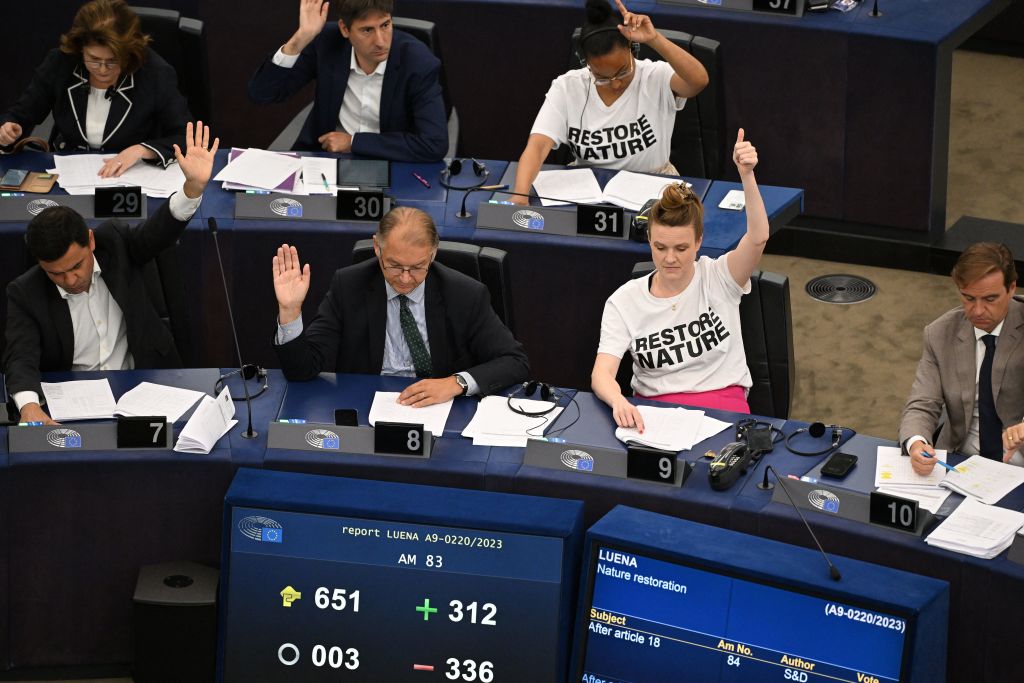Should the United States be more like Europe—greener and with a more generous social safety net? For most on America’s left, the answer is a no-brainer. But recent developments remind us that the European model comes with a hefty price tag.
Europeans seem to want to have it all: stringent environmental and regulatory standards to drive decarbonization; “strategic autonomy,” especially from powers such as Russia or China; and rising levels of economic prosperity. These goals form a policy trilemma. Europeans can pick two—or a limited combination of the three—but they cannot pursue all three at once. And that should be a warning to Americans.
Already, Europe’s growth record is deeply unflattering. Between 2000 and 2019, the EU’s economy expanded at an average annual rate of just 1.4 percent. If the United States became a member of the EU, it would be its third wealthiest member, right after Luxembourg and Ireland, whose national income statistics are skewed by the presence of headquarters of large multinational companies operating across the EU.
Conversely, if EU member states joined the Union, they would be on its poorest fringe: In terms of purchasing power, Austria, Sweden, and Germany, some of the EU’s most prosperous economies, are poorer than Oklahoma or Tennessee, which fall into the bottom third of U.S. states by real per-capita income. Spain and Portugal, alongside the growing-but-still-poor Eastern European countries, have lower incomes than the least well-off U.S. economy, Mississippi.
It is dawning on some Europeans that having it all is impossible. Consider, for example, the recent fight over the passage of the EU’s Nature Restoration Law, proposed by the European Commission, which sought to convert as much as 10 percent of Europe’s arable land into forests and other biodiverse ecosystems, thus reducing the bloc’s agricultural output.
The bill was attacked by Manfred Weber, the leader of the European People’s Party (EPP), on the grounds that it would harm farmers and that it was bad to threaten food supplies in a time of war. That put him at odds with EC President Ursula von der Leyen, a fellow member of the EPP, who has made an ambitious environmental and climate agenda central to her tenure.
Weber failed to stop the nature restoration law, which was passed with a small number of EPP votes. Yet, he has succeeded in getting the bill watered down significantly—its provision to convert agricultural land was dropped, and its implementation was delayed until a review of its impact on the EU’s food security is completed.
Not only is there a trade-off between environmental goals and economic growth, but the single-minded pursuit of the former can clash with the objective of making the EU less dependent on other powers. With the EU’s planned phasing out of new combustion engines by 2035, it is all but inevitable that Europe’s automotive industry’s ties to China, a major producer of both batteries and electric vehicles (EVs), will deepen. As of now, European auto manufacturers have no alternatives to Chinese batteries—a situation that will only get worse if European EV production grows in scale.
Going green, fast, will cost—both in terms of money and in terms of creating a new dependency on China. Faster growth can be squeezed out of the European economy either through deregulation driving up productivity at home—think easier land-use rules, more fracking, and more dynamic labor markets offering weaker worker protection—or through an ambitious trade agenda. For more “strategic autonomy,” Europeans need to get ready for EU-produced goods and services that are more costly or inferior to imported alternatives, or for a regulatory scheme that would make European industry, energy extraction, and other sectors competitive.
Weber’s revolt has provided an opening for a much-overdue conversation about the hard choices before Europe. To instead continue to assume that Europeans can be pushed into more economic hardship for the sake of lofty environmental goals at a time when their real incomes are stagnating and when the continent faces unprecedented geopolitical threats is not only bad politics but also terrible statecraft. Let the magical thinking that dominated Europe’s policy debates for far too long be a warning to the United States—not an example to follow.






Please note that we at The Dispatch hold ourselves, our work, and our commenters to a higher standard than other places on the internet. We welcome comments that foster genuine debate or discussion—including comments critical of us or our work—but responses that include ad hominem attacks on fellow Dispatch members or are intended to stoke fear and anger may be moderated.
With your membership, you only have the ability to comment on The Morning Dispatch articles. Consider upgrading to join the conversation everywhere.